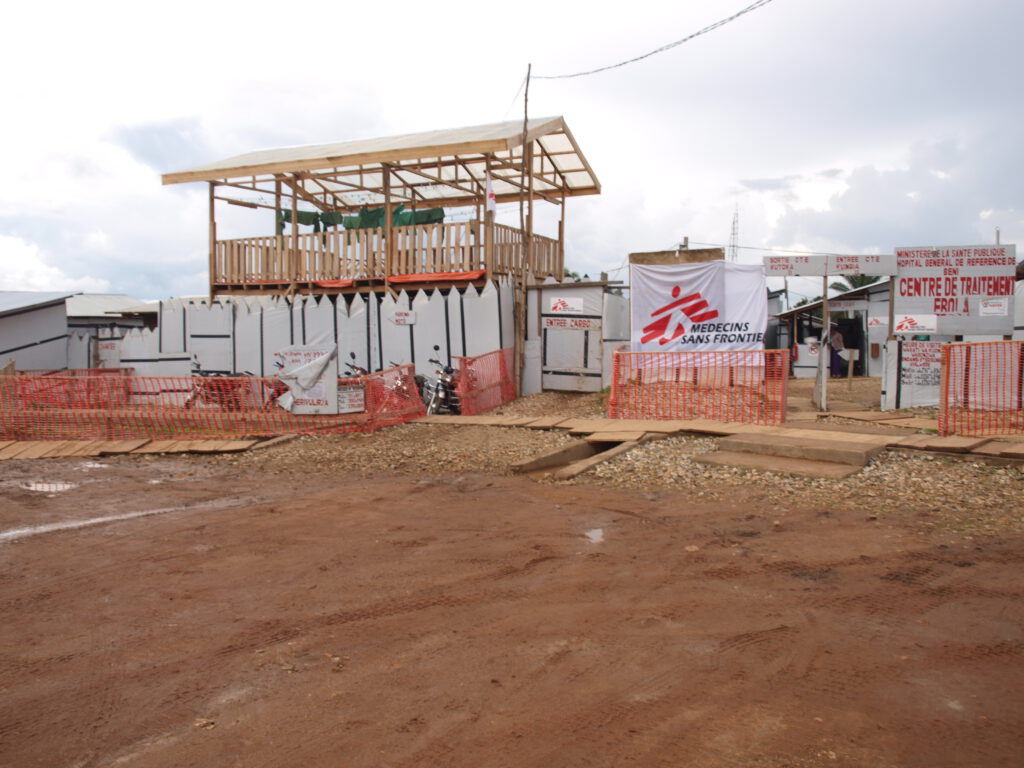By Kennedy Muhindo Wema

In North Kivu, the Covid-19 pandemic is entangled with the history of Ebola epidemics. In Beni—a hot spot of the Ebola epidemic from 2018 to 2020—Covid-19 patients are quarantined and receive care in the former Ebola treatment center at the General Hospital in Beni. This is the result of the fact that the Covid-19 pandemic emerged in the area in the aftermath of the eradication of the 10th Ebola virus disease epidemic unlike in the rest of the country. There was no other infrastructure to house Covid-19 patients. The ETC (Ebola Treatment Center) was empty and unused. The health authorities therefore simply took advantage of these facilities to allocate part of them to the treatment of Covid-19 positive patients. Ebola thus served Covid by offering not only infrastructure but also health workers trained in the fight against epidemics. Of course, these health workers were quickly taken in by an international NGO.
However, during the response to the Covid-19 pandemic, health workers were also quickly disillusioned. They felt they were left abandoned when Ebola resurfaced in Equateur province – the 11th Ebola outbreak in the DRC – just months after Covid-19 had broken out in the country. The NGO left to support the Ebola response teams on the other side of the Congo, leaving behind Covid-19 responders in Beni who. Unfortunately, they did not receive any support from the Congolese state. Allowances have suddenly been cut. Even the supplies for laboratories broke away. “Since they left, I have never been paid. I don't like it when people talk to me about taking care of me, because I became a volunteer and I work in high-risk conditions, exposed to contamination…”, explained one agent.
The international NGO returned to Beni during the 13th Ebola epidemic but without resuming its involvement in the response to Covid-19, although the Covid treatment center and the Ebola treatment center were on the same compound. Some actors working for the INRB (National Institute of Biomedical Research) laboratory, who conduct the PCR tests for Covid-19, confirmed that they were taken over by an international NGO that had been actively working in the response.
The response against Covid-19 has been rather benefitting from the remnants of the 10th Ebola virus epidemic than learning from it. Whether it is health workers, infrastructure of care and treatment, laboratory instruments as well as the human resources assigned to them, all are a legacy of the response against the 10th Ebola epidemic.
Ebola business frustrates poor Covid
Covid-19 is treated like an orphaned child (“parent pauvre”). There is no large-scale funding from the government or from NGOs. Compared to the Ebola epidemic for which the international NGOs and the United Nations agencies had invested a lot of resources to eradicate the epidemic, the response against Covid-10 is like an orphaned child. Several people involved in the fight have told us that they have not been paid since the beginning of the pandemic. The supplies are also missing. There are unpaid allowances like for the vaccination teams. Salaries do not reach the providers, and worse, the actors keep on performing their duties, which have become heavier with the treatment of Covid patients. “We participated in the administration of the astrazeneka vaccine but until this moment—October 2021—we have never been paid for this work. But we have used the techniques acquired during the vaccination against Ebola in 2018,” said a nurse from a health center. Even basic training programs to adapt the response to the Covid-19 pandemic is lacking or insufficient. Motorcycle cab drivers who had been heavily involved in the fight against Ebola told us they had not received any training to participate in the response to the Covid-19 pandemic. “We all listen to it on the radio, like everyone else. We have never been brought together to be sensitized. But we are taking precautions by respecting the social distancing measures,“ they said. The response to Covid-19 is really struggling to take responsibility.
No supplies for testing in the health centers in Beni
Covid-19 tests are not performed in the health centers of Beni town and territory. There are no supplies available for the health centers. A laboratory technician told us that he was not aware of any supplies. “I can easily perform a test but how will I do it when the material is absent. The samples are taken and sent to the general hospital for testing, where the IRNB laboratory is located“, he explains. This statement was also made to us by some nurses from the health centers. The problem of shortages to perform tests is real. Another stakeholder in the response to Covid-19 confirmed that he is often out of stock.
The situation is difficult for the Covid-19. However, North Kivu is probably better prepared to fight the Covid-19 pandemic, which arrived the day after the victory against the 10th Ebola epidemic, then the rest of the country. While the population quickly understood and adopted social distancing measures against the pandemic, the government failed to keep up with the pace put forth by those drawing on the achievements of the Ebola response. The response against Covid-19 is an orphaned child that suffers from a lack of resources. Experienced staff is there, trained during the Ebola response, but the financial means are almost non-existent.